|
|
|
Sort Order |
|
|
|
Items / Page
|
|
|
|
|
|
|
| Srl | Item |
| 1 |
ID:
112367
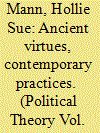

|
|
|
|
|
| Publication |
2012.
|
| Summary/Abstract |
Earlier discussions of care have both insisted on its importance to political life and decried the unequal burden borne by women in care work. Yet they have failed to demonstrate why for reasons above and beyond the instrumental ends it serves. We ought to make the cultivation of an ongoing practice of caregiving a political priority. This article redefines and reframes care as a thoroughly critical and deeply embodied practice that is central to the flourishing of human beings. By way of Aristotle, I situate philia and embodied practices of care at the center of the shaping of the citizen and demonstrate a deeper significance of relations of care to our political life. When this is done alongside attention to habituation to right action and thinking, we can see more clearly how a particular kind of embodied politics can activate and sustain an ethic that cultivates citizens' capacities and desires to care.
|
|
|
|
|
|
|
|
|
|
|
|
|
|
|
|
| 2 |
ID:
092140
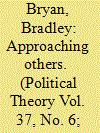

|
|
|
|
|
| Publication |
2009.
|
| Summary/Abstract |
The essay sheds light on Aristotle's understanding of friendship and its relation to political life.The author challenges the usual view that Aristotle postulates three distinct kinds of friendship. Instead the author argues that Aristotle understood there to be only one kind of friendship, and that other "friendships" were to Aristotle "unfinished" and thus not friendship at all. Aristotle shows that the relation between friendship and politics is grounded in friendship's possibility for human beings, and not as something cherished for its actuality. By looking at proper friendship as possibility and not actuality, we could only ever interpret the infamous statement attributed to Aristotle-"my friends, there are no friends"-not as illuminating of what friendship is but rather as a nostalgic diagnosis of the decay of the possibility of friendship, and hence of politics. By extension, and more poignantly, interpreting Aristotle's work on friendship in this light, we stand ready to reinterpret the mobilization of Aristotelian friendship for contemporary understandings of democratic practice.
|
|
|
|
|
|
|
|
|
|
|
|
|
|
|
|
| 3 |
ID:
085892
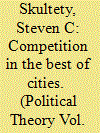

|
|
|
|
|
| Publication |
2009.
|
| Summary/Abstract |
By examining his account of individual virtues, making inferences from his analyses of flawed cities, and teasing out the tacit assumptions behind claims about the nature of political activity, I argue that Aristotle thinks of competition as being a political ideal rather than as an inevitable corruption of civic life. Virtuous citizens compete for civic honor through traditional "competitive outlays" and contend against one another for prestigious offices in the city. Moreover, I argue that the very structure of political deliberation is competitive. It is through a "vis-à-vis" competition among proposals that a winning policy is adopted, and the speakers who offer these proposals are themselves involved in a competition for political influence.
|
|
|
|
|
|
|
|
|
|
|
|
|
|
|
|
| 4 |
ID:
121092


|
|
|
|
|
| Publication |
2013.
|
| Summary/Abstract |
A satisfactory model of decision-making in an epistemic democracy must respect democratic values, while advancing citizens' interests, by taking account of relevant knowledge about the world. Analysis of passages in Aristotle and legislative process in classical Athens points to a "middle way" between independent-guess aggregation and deliberation: an epistemic approach to decision-making that offers a satisfactory model of collective judgment that is both time-sensitive and capable of setting agendas endogenously. By aggregating expertise across multiple domains, Relevant Expertise Aggregation (REA) enables a body of minimally competent voters to make superior choices among multiple options, on matters of common interest. REA differs from a standard Condorcet jury in combining deliberation with voting based on judgments about the reputations and arguments of domain-experts.
|
|
|
|
|
|
|
|
|
|
|
|
|
|
|
|
| 5 |
ID:
077334
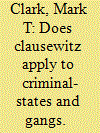

|
|
|
|
|
| Publication |
2006.
|
| Summary/Abstract |
Criminal-States and Criminal-Soldiers present unique problems for contemporary international political theory. This essay examines the applicability of the theory of war developed by Carl von Clausewitz to Criminal-States and Criminal-Soldiers. As modified by Aristotle's idea of justice as the basis for the political community, this essay proposes that Clausewitz's famous connection between politics and war holds where such states and soldiers evince political behavior. Some contrasting implications for states and state leaders are examined when such entities evince - and do not evince - political behavior
|
|
|
|
|
|
|
|
|
|
|
|
|
|
|
|
| 6 |
ID:
101834
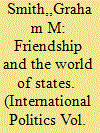

|
|
|
|
|
| Publication |
2011.
|
| Summary/Abstract |
What contribution can a theorization of friendship offer to the understanding of the world of states? It is argued here that the contemporary view of friendship eclipses a longer and broader appreciation. As such, the view of friendship that identifies it as affective, private and particular (here termed the contemporary-affective view) is one instance of a much wider cluster of ideas sharing overlapping characteristics. So conceptualized, 'friendship' is the concern with what binds person-to-person. It is a concern with the nature and fabric of the political. Seen from this vantage point, friendship highlights what an analysis through the state tends to overshadow: the enduring affinities, identifications and bonds that permeate the dynamics of the world of states. Thus, friendship need not remain the preserve of the premodern (Aristotle), nor be usurped as an adjunct to sovereignty and power (Schmitt), but investigated as an ongoing site of analysis for phenomena within, between and beyond states.
|
|
|
|
|
|
|
|
|
|
|
|
|
|
|
|
| 7 |
ID:
053823
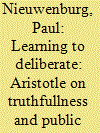

|
|
|
| 8 |
ID:
110642


|
|
|
|
|
| Publication |
2011.
|
| Summary/Abstract |
This article addresses the pedagogical value of teaching Aristotle's Politics 4.1 early in an introductory course in political theory that draws texts from the history of political thought. I argue that this chapter provides an interpretive key to understanding arguments made elsewhere in the Politics and can be used to introduce students to the kinds of theorizing that appear in the study of politics more generally. I begin by laying out some common learning obstacles that students experience in introductory political theory courses, using Politics 4.1 to address these issues. I then outline my approach to this text and conclude by reflecting on some of the possibilities and limitations of this method of introducing the nature of political theory to an undergraduate population.
|
|
|
|
|
|
|
|
|
|
|
|
|
|
|
|
| 9 |
ID:
071673


|
|
|
|
|
| Publication |
2006.
|
| Summary/Abstract |
This article suggests that the current rise of the rule of law as a mobilising political principle may be understood as a response to contemporary anxiety about authority. It also argues that the recent increase in states of emergency is complemented by an expansive legalism. First, the paper reviews Giorgio Agamben's description of legal expansion through states of emergency (or 'exception') dictated by a language of fear. Second, in a philological inquiry, it accompanies the 'founding father' of the rule of law, Aristotle, in his discussion of law's sovereignty. The core question posed by Aristotle- regarding the inquiry into the ideal relationship between law and its administration-remains unresolved in his Politics. Finally, the analysis is grounded in judicial responses to states of emergency. In recent case law, the courts both facilitate the production of emergency regimes and provide a locus for contestation of their parameters.
|
|
|
|
|
|
|
|
|
|
|
|
|
|
|
|
| 10 |
ID:
096064
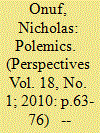

|
|
|
| 11 |
ID:
117085
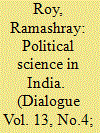

|
|
|
| 12 |
ID:
113847
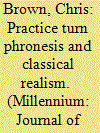

|
|
|
|
|
| Publication |
2012.
|
| Summary/Abstract |
The 'practice turn' in International Relations seems on the face of it to be a very promising development; generally associated with Bourdieu and Foucault, it can also be seen as linked to the Aristotelian notion of phronesis (prudence or practical wisdom) and to the classical realist virtue of 'prudence' (prudentia). There are family resemblances here, but also differences; for Aristotle and the realists, practical wisdom is associated more with the intellect, while the 'practice turn' places great emphasis on the role of habitual behaviour. Writers as diverse as Flyvbjerg and Macintyre have argued for a 'phronetic social science' as an alternative to neo-positivist conceptions of the role of the conduct of social enquiry - but the classical realists could argue that they have already provided a 'phronetic international relations theory' . Still, the implications of Aristotle's comment that 'prudent young people do not seem to be found' need to be confronted. Is 'practical wisdom' something that can be achieved by study, or is it only achievable in the context of the kind of lived experience that few students of International Relations or International Political theory of whatever age can actually claim?
|
|
|
|
|
|
|
|
|
|
|
|
|
|
|
|
| 13 |
ID:
073488


|
|
|
|
|
| Publication |
2006.
|
| Summary/Abstract |
This essay asks why Aristotle, certainly no friend to unlimited democracy, seems so much more comfortable with unconstrained rhetoric in political deliberation than current defenders of deliberative democracy. It answers this question by reconstructing and defending a distinctly Aristotelian understanding of political deliberation, one that can be pieced together out of a series of separate arguments made in the Rhetoric, the Politics, and the Nicomachean Ethics.
|
|
|
|
|
|
|
|
|
|
|
|
|
|
|
|
| 14 |
ID:
051377
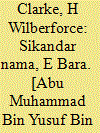

|
|
|
|
|
| Publication |
DelhI, Low Price Publications, 1995.
|
| Description |
xxxi, 831p.Hbk
|
| Standard Number |
8186142851
|
|
|
|
|
|
|
|
|
|
|
|
Copies: C:1/I:0,R:0,Q:0
Circulation
| Accession# | Call# | Current Location | Status | Policy | Location |
| 048101 | 891.5366/CLA 048101 | Main | On Shelf | General | |
|
|
|
|
| 15 |
ID:
119772
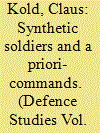

|
|
|
|
|
| Publication |
2013.
|
| Summary/Abstract |
This article outlines two positions in the ongoing discussion in the sociology of the military regarding the horizontal cohesion of battle groups, the vertical esprit de corps and the influence of both on task efficiency. The two concepts are reached through two different ways of observation - an empiricist field study approach and a rationalist survey approach. Field study data generated through direct observations whereas survey data is generated through indirect observation in which general concepts are used. Central is that the use of different methods, also generate different kinds of data. Such a difference is not merely of theoretical interest but also of vital importance to both the political decision process and the military leadership and management process as they rely on correct intelligence before, during and after operations. This article outlines the discussion between the two positions and then goes on to present an attempt to resolve the discussion between the rationalis and the empiricist position in the sociology of the military by using the theories of Agnes Heller. The central concept to theoretically and practically connect a rationalist and an empirist position is the concept of a vivid present - in this context used as a military vivid present.Its heuristic value is demonstrated through two cases from a field study of Danish KFOR (Kosovo Force).
|
|
|
|
|
|
|
|
|
|
|
|
|
|
|
|
| 16 |
ID:
163576
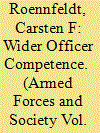

|
|
|
|
|
| Summary/Abstract |
Identifying and developing officer competence is important to a nation’s security and a crucial attribute of a legitimate military establishment. Critics have claimed that the U.S. officer corps favors a narrow conception of expertise that limits the armed forces’ utility as an instrument of policy. Drawing from the dialogue between Huntington and Janowitz, as well as Aristotle’s notion of practical wisdom, this article proposes a wider understanding of officer competence consisting of four distinct conceptual categories. The U.S. defense establishment favors “military skill” over other categories of competence. As a result, the officer corps is poorly prepared for 21st-century warfare. To remedy this situation, professional military education should cultivate military leaders that, in addition to military skill, have sociopolitical competence and practical wisdom. In this context, this article suggests strategies to develop such competencies that officers need to be able to achieve a diversity of national political goals.
|
|
|
|
|
|
|
|
|
|
|
|
|
|
|
|
|
|
|
|
|